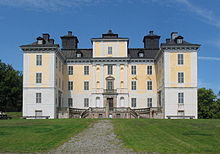A general officer is an officer of high rank in the armies, and in some nations' air forces, space forces, and marines or naval infantry.

A brigade is a major tactical military formation that typically comprises three to six battalions plus supporting elements. It is roughly equivalent to an enlarged or reinforced regiment. Two or more brigades may constitute a division.

Ludwig August Theodor Beck was a German general and Chief of the German General Staff during the early years of the Nazi regime in Germany before World War II. Although Beck never became a member of the Nazi Party, in the early 1930s he supported Adolf Hitler's forceful denunciation of the Treaty of Versailles and the need to re-arm, although he believed Germany needed more time to rearm before starting a war.

The Gloster Gladiator is a British biplane fighter. It was used by the Royal Air Force (RAF) and the Fleet Air Arm (FAA) and was exported to a number of other air forces during the late 1930s.
Oberstleutnant is a senior field officer rank in several German-speaking and Scandinavian countries, equivalent to lieutenant colonel. It is currently used by both the ground and air forces of Austria, Germany, Switzerland, Denmark, and Norway. The Swedish rank överstelöjtnant is a direct translation, as is the Finnish rank everstiluutnantti.

Herbert Charles Angelo Kuchačevič ze Schluderpacheru, known professionally as Herbert Lom, was a Czech-British actor with a career spanning over 60 years. His cool demeanour and precise, elegant elocution saw him cast as criminals or suave villains in his younger years, and professional men and nobles as he aged. Highly versatile, he also proved a skilled comic actor in The Pink Panther franchise, playing the beleaguered Chief Inspector Charles Dreyfus in seven films.
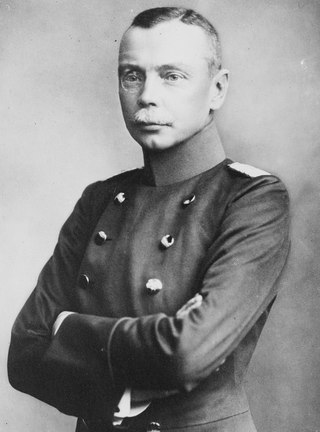
Johannes "Hans" Friedrich Leopold von Seeckt was a German military officer who served as Chief of Staff to August von Mackensen and was a central figure in planning the victories Mackensen achieved for Germany in the east during the First World War.
Peter Watkins is an English film and television director. He was born in Norbiton, Surrey, lived in Sweden, Canada and Lithuania for many years, and now lives in France. He is one of the pioneers of docudrama. His films present pacifist and radical ideas in a nontraditional style. He mainly concentrates his works and ideas around the mass media and our relation/participation to a movie or television documentary.
The Schwarze Kapelle was a term used by the Gestapo to refer to a group of conspirators in Nazi Germany, including many senior officers in the Wehrmacht, who plotted to overthrow Adolf Hitler. Unlike the Rote Kapelle, the name given by the Gestapo to the Soviet spy network in the Third Reich, many members of the Black Orchestra were of aristocratic background, felt contempt for the ideology of the Nazi Party, and were politically close to the Western Allies.
Oberst is a senior field officer rank in several German-speaking and Scandinavian countries, equivalent to Colonel. It is currently used by both the ground and air forces of Austria, Germany, Switzerland, Denmark, and Norway. The Swedish rank överste is a direct translation, as are the Finnish rank eversti and the Icelandic rank ofursti.
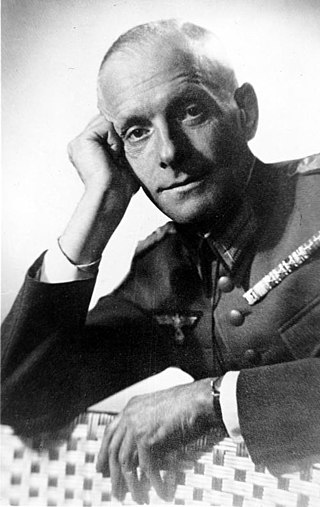
The Oster Conspiracy of 1938 was a proposed plan to overthrow German Führer Adolf Hitler and the Nazi regime if Germany went to war with Czechoslovakia over the Sudetenland. It was led by Generalmajor Hans Oster, deputy head of the Abwehr and other high-ranking conservatives within the Wehrmacht who opposed the regime for behavior that was threatening to bring Germany into a war that they believed it was not ready to fight. They planned to overthrow Hitler and the Nazi regime through a storming of the Reich Chancellery by forces loyal to the plot to take control of the government, who would either arrest or assassinate Hitler, and restore the Monarchy under Prince Wilhelm of Prussia, the grandson of Wilhelm II.
General Peter Courtney Gration is a retired senior Australian Army officer who served in the positions of Chief of the General Staff (1984–87) and Chief of the Defence Force (1987–93), the professional head of the Australian Army and Australian Defence Force, respectively.

The Kumul Rebellion was a rebellion of Kumulik Uyghurs from 1931 to 1934 who conspired with Hui Chinese Muslim General Ma Zhongying to overthrow Jin Shuren, governor of Xinjiang. The Kumul Uyghurs were loyalists of the Kumul Khanate and wanted to restore the heir to the Khanate and overthrow Jin. The Kuomintang wanted Jin removed because of his ties to the Soviet Union, so it approved of the operation while pretending to acknowledge Jin as governor. The rebellion then catapulted into large-scale fighting as Khotanlik Uyghur rebels in southern Xinjiang started a separate rebellion for independence in collusion with Kirghiz rebels. The various groups of rebels were not united. The main part of the war was waged by Ma Zhongying against the Xinjiang government. He was supported by Chiang Kai-shek, the Premier of China, who secretly agreed to let Ma seize Xinjiang.

On 4 May 1945, at 18:30 British Double Summer Time, at Lüneburg Heath, south of Hamburg, Field Marshal Sir Bernard Montgomery accepted the unconditional surrender of the German forces in the Netherlands, northwest Germany including all islands, in Denmark and all naval ships in those areas. The surrender preceded the end of World War II in Europe and was signed in a carpeted tent at Montgomery's headquarters on the Timeloberg hill at Wendisch Evern.
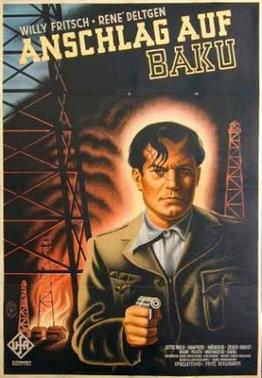
Attack on Baku is a 1942 German thriller film directed by Fritz Kirchhoff and starring Willy Fritsch, René Deltgen, and Fritz Kampers. The film was intended as anti-British propaganda during the Second World War. It is noted for its set designs by Otto Hunte, who showed a fascination for modern technology in his depiction of the oil town. The film was shot on location in German-allied Romania, and at Babelsberg Studio in Berlin.
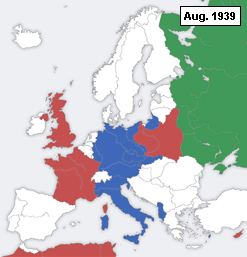
This is a timeline of declarations of war during World War II.

During the Second World War, Pope Pius XII maintained links to the German resistance to Nazism against Adolf Hitler's Nazi regime. Although remaining publicly neutral, Pius advised the British in 1940 of the readiness of certain German generals to overthrow Hitler if they could be assured of an honourable peace, offered assistance to the German resistance in the event of a coup, and warned the Allies of the planned German invasion of the Low Countries in 1940. The Nazis considered that the Pope had engaged in acts equivalent to espionage.

Alan Charles Rawlinson, was an Australian airman who became a fighter ace in World War II. He was credited with at least eight aerial victories, as well as two aircraft probably destroyed, and another eight damaged.

This is a list of underwater divers whose exploits have made them notable. Underwater divers are people who take part in underwater diving activities – Underwater diving is practiced as part of an occupation, or for recreation, where the practitioner submerges below the surface of the water or other liquid for a period which may range between seconds to order of a day at a time, either exposed to the ambient pressure or isolated by a pressure resistant suit, to interact with the underwater environment for pleasure, competitive sport, or as a means to reach a work site for profit or in the pursuit of knowledge, and may use no equipment at all, or a wide range of equipment which may include breathing apparatus, environmental protective clothing, aids to vision, communication, propulsion, maneuverability, buoyancy and safety equipment, and tools for the task at hand.

